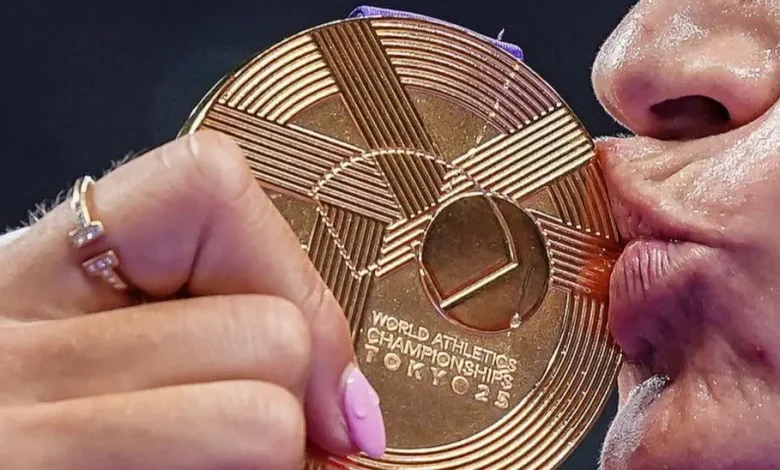
Great Britain and Northern Ireland failed to win a gold medal at a World Athletics Championships for the first time in 22 years, as they secured their joint-lowest overall return since 2005.
GB ended the nine-day competition with a total of five medals, level with their 2019 tally in Doha, while they last won fewer 20 years ago in Helsinki – where they finished with three.
Great Britain head coach Paula Dunn told BBC Sport that the aim for Tokyo was to win five to eight medals – but no target was set for a medal table finish.
The 64-strong British squad finished 21st in the medal table.
The team’s fortunes were summed up in the event which provided their final medal opportunity in Japan, as the women’s 4x100m relay quartet – winners of Olympic silver last year – finished two-tenths of a second off the podium.
That confirmed Great Britain would fail to win a relay medal, of any colour, for the first time since Paris in 2003.
That was also the last occasion they finished without a gold.
It comes after the team equalled their best haul of 10 medals to finish seventh at the previous World Championships two years ago.
On that occasion, they brought home two gold medals, three silvers and five bronze from Budapest.
They also achieved GB’s best return at an Olympics for 40 years with 10 athletics medals at Paris 2024.
Reflecting on the championships, Dunn said: “Definitely a mixed bag. Five medals which is good and I’m pleased to see, and some missed opportunities.
“So it’s time for us to go back sit down with the coaches and athletes, reflect and do a review and see how we move forward.”
In Tokyo, Jake Wightman ended GB’s medal wait on day five with men’s 1500m silver, before Amy Hunt claimed her first global individual medal with silver in the women’s 200m.
Katarina Johnson-Thompson shared bronze in a dramatic heptathlon finale on Saturday.
Georgia Hunter Bell led Olympic champion Keely Hodgkinson to a British medal double in the women’s 800m final, however their bid for a stunning one-two was spoiled by Kenya’s Lilian Odira in Tokyo.
There was some misfortune among the disappointment, with defending 1500m champion Josh Kerr, Olympic and world 400m silver medallist Matthew Hudson-Smith and 2024 world indoor pole vault champion Molly Caudery each suffering injuries.
Elsewhere, marathon runner Emile Cairess could not complete the men’s marathon, which took place amid high temperatures and stifling humidity.
Despite relay medals supplying five of GB’s 10 athletics medals at last summer’s Games, there was no success here – with the men’s 4x100m quartet failing to get the baton round in their heat.
Tokyo ended a run of five successive years with a global championships, although World Athletics will hold its inaugural Ultimate Championships next year to fill the gap before the World Championships in Beijing in 2027.
During the championships, the conditions in which the athletes have had to compete and the distance between the warm-up facilities and the stadium have both been raised as issues.
Temperatures above 30C were accompanied by stifling humidity throughout the majority of the championships.
Cairess, a medal hope after placing fourth at the Paris Olympics last summer, said he “just got too hot” after dropping out of the men’s marathon with less than three of the 26.2 miles remaining.
Dunn said the humidity in particular had “surprised us”.
“We knew it was going to be hot and humid but one day you could see the humidity in the sky, it was so thick.
“We did as much preparation as we can in terms of heat preparation but it is incredibly difficult to manage it. We had an ice strategy, a cooling strategy.
“Because we’re coming to Beijing in 2027, we’ve had a dress rehearsal. We know Beijing is going to be exactly like this so the athletes that have experienced it are going be ready for it and that’s going to be an advantage.”



